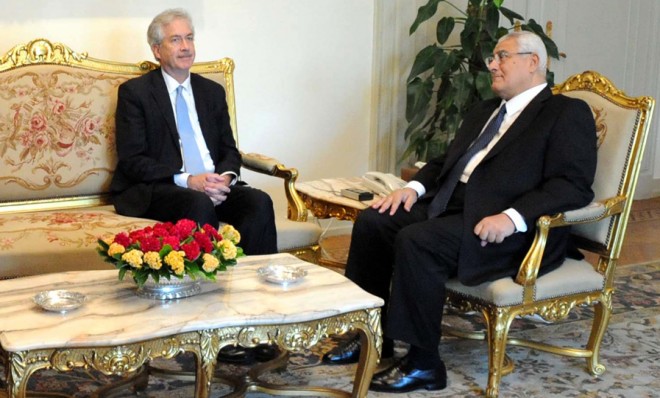Can the U.S. help broker peace in Egypt?
Washington sends a high-level envoy to talk to the country's interim leaders


A free daily email with the biggest news stories of the day – and the best features from TheWeek.com
You are now subscribed
Your newsletter sign-up was successful
The U.S. reopened its embassy in Cairo on Monday and the Obama administration sent a high-ranked envoy for its first direct talks with the military-backed government that replaced Mohamed Morsi, Egypt's recently deposed president. The twin moves are the latest evidence that Washington is willing to work with Egypt's interim leadership, which has promised a prompt return to elected civilian rule.
The envoy, Deputy Secretary of State William J. Burns, did not get a warm reception outside the halls of government, however. Egypt's feuding sides — the Tamarod (or Rebellion) movement that precipitated Morsi's fall, and the Muslim Brotherhood demanding his return — refused to meet with Burns. If the U.S. is getting rebuffed by both camps, can it hope to play a role making peace?
Burns certainly has significant hurdles ahead. One of the most important tasks is bringing the Muslim Brotherhood back to the table, because it will be difficult — if not impossible — to convince voters that the coming elections are legitimate if the leading Islamist group in the country refuses to participate.
The Week
Escape your echo chamber. Get the facts behind the news, plus analysis from multiple perspectives.

Sign up for The Week's Free Newsletters
From our morning news briefing to a weekly Good News Newsletter, get the best of The Week delivered directly to your inbox.
From our morning news briefing to a weekly Good News Newsletter, get the best of The Week delivered directly to your inbox.
One big problem for the U.S. is that neither side trusts the U.S. The anti-Morsi protesters are furious at the U.S. Ambassador to Egypt Anne Patterson for discouraging the protests against his government and emphasizing his electoral legitimacy. Meanwhile, the Muslim Brotherhood is outraged at American diplomats for saying Morsi's rule was undemocratic.
"If the Obama administration wants to work with the interim government to shape events," says Ed Morrissey at Hot Air, "it has to start repairing the damage with the Egyptian populace first." As Morrissey sees it, maybe pulling Patterson off the stage and replacing her with Burns will help.
George Packer at The New Yorker says, however, that critics on all sides wildly overstate America's potential to influence events. We could cut off Egypt's $1.3 billion in annual military aid, for example, as punishment for Morsi's overthrow, but it is doubtful that would make much difference to a country that received $8 billion from Qatar while he was in power, and $12 billion from Saudi Arabia, Kuwait, and the United Arab Emirates since he was pushed aside.
Nothing good will come of the overthrow of Morsi's bad government if Egypt's next transition doesn't find a place for all of the country's legitimate factions. America may no longer have the leverage to insure an outcome favorable to its interests or its values, but it should use its remaining influence to help Egypt’s factions move past their own zero-sum game. [New Yorker]
Given the pitfalls, there's another option. The U.S. could simply butt out. That, says Abdulrahman al-Rashed at Al Arabiya, is America's "best option." The U.S., he says, should "keep away from Cairo’s rebellious Squares. The Egyptians know better about their own affairs. Whoever emerges victorious will not find an alternative for the U.S. as a strategic ally."
A free daily email with the biggest news stories of the day – and the best features from TheWeek.com
Harold Maass is a contributing editor at The Week. He has been writing for The Week since the 2001 debut of the U.S. print edition and served as editor of TheWeek.com when it launched in 2008. Harold started his career as a newspaper reporter in South Florida and Haiti. He has previously worked for a variety of news outlets, including The Miami Herald, ABC News and Fox News, and for several years wrote a daily roundup of financial news for The Week and Yahoo Finance.
-
 How the FCC’s ‘equal time’ rule works
How the FCC’s ‘equal time’ rule worksIn the Spotlight The law is at the heart of the Colbert-CBS conflict
-
 What is the endgame in the DHS shutdown?
What is the endgame in the DHS shutdown?Today’s Big Question Democrats want to rein in ICE’s immigration crackdown
-
 ‘Poor time management isn’t just an inconvenience’
‘Poor time management isn’t just an inconvenience’Instant Opinion Opinion, comment and editorials of the day
